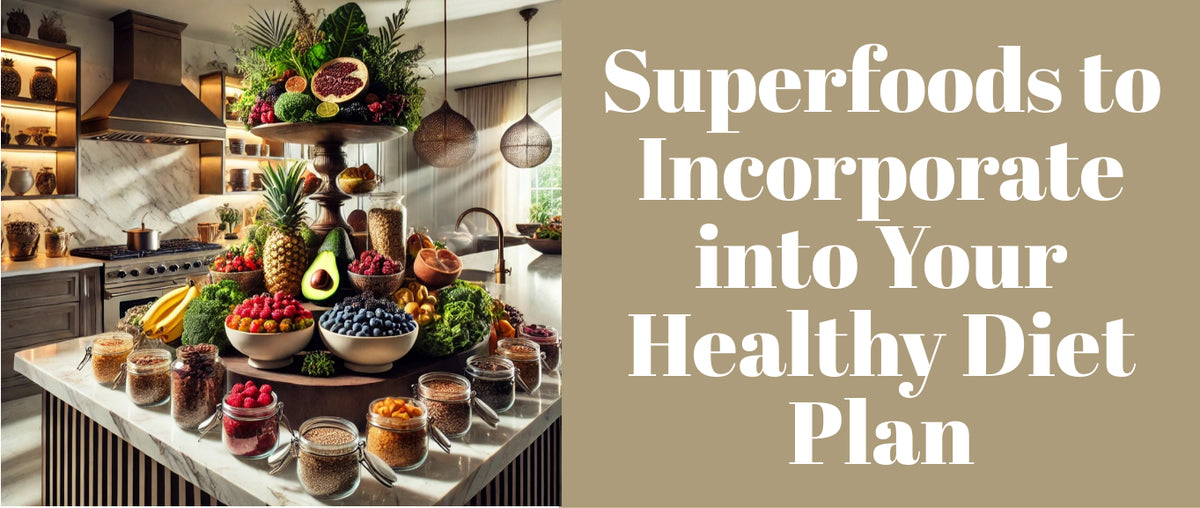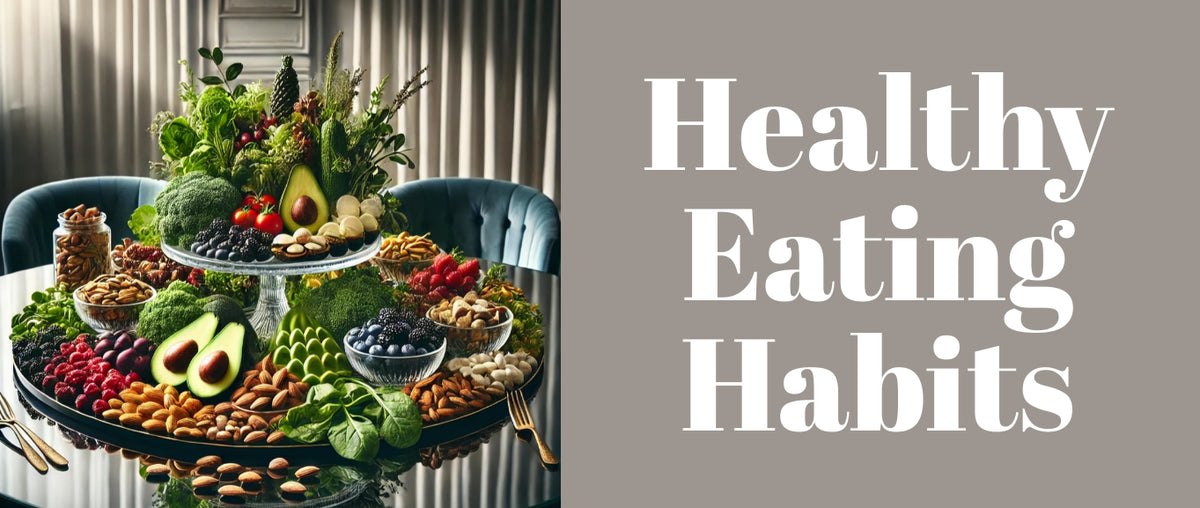Superfoods to Incorporate into Your Healthy Diet Plan
Incorporating superfoods into your diet is an effective way to ensure a balanced and healthy diet. These nutrient-dense foods are packed with essential vitamins, minerals, antioxidants, and other nutrients that promote overall health and prevent chronic diseases. Whether your goal is to improve heart health, boost brain function, or maintain a healthy weight, superfoods can be powerful allies in achieving your health goals.
In this comprehensive guide, we will explore a wide range of superfoods that should be staples in your diet. We'll discuss their health benefits, how to incorporate them into your meals, and debunk common myths surrounding these nutrient powerhouses. Additionally, we'll provide practical tips for meal planning and budget-friendly options, making it easier for you to enjoy the benefits of superfoods every day.
Key Takeaways
- Superfoods are nutrient-dense and provide significant health benefits.
- They help reduce the risk of chronic diseases such as heart disease and cancer.
- Incorporating superfoods into your diet is easier than you think with the right tips and tricks.
- Myths about superfoods often lead to misconceptions; understanding the facts is crucial.
- Variety and balance are key in making the most of superfoods.
What Are Superfoods?
Superfoods are foods that are packed with nutrients and offer exceptional health benefits relative to their caloric content. These foods are typically rich in vitamins, minerals, antioxidants, and other essential nutrients. The concept of superfoods is not scientifically defined, but it has become widely accepted as a way to categorize foods that provide significant health benefits.
While the term superfood is often used as a marketing tool, the foods commonly classified as such are genuinely beneficial when included in a balanced diet. Superfoods are known for their ability to boost health, fight disease, and provide essential nutrients in a relatively low-calorie package. This makes them ideal for those looking to maintain or improve their health through diet.
Health Benefits of Superfoods
Superfoods offer a wide range of health benefits, making them an essential part of any diet aimed at improving overall health and well-being. Here are some of the key benefits:
1. Nutritional Density: Superfoods like berries and dark leafy greens are packed with vitamins, minerals, and antioxidants, providing more nutrients per calorie than most other foods.
2. Antioxidant Power: Many superfoods are rich in antioxidants, which help protect the body from oxidative stress and reduce the risk of chronic diseases.
3. Heart Health: Foods such as nuts, seeds, and fatty fish are excellent sources of healthy fats and fiber, which help manage cholesterol levels and reduce the risk of heart disease.
4. Weight Management: The high fiber content in superfoods helps you feel full longer, which can aid in weight management by reducing the need for snacking on unhealthy foods.
5. Enhanced Cognitive Function: Certain superfoods, such as fatty fish and berries, have been shown to support brain health, improving memory and reducing the risk of cognitive decline.

Top Superfoods to Incorporate into Your Diet
Let's explore some of the most beneficial superfoods that you can incorporate into your diet:
1. Berries (e.g., blueberries, strawberries, raspberries)
- Health Benefits: Berries are some of the most antioxidant-rich fruits available, particularly high in anthocyanins. These antioxidants help reduce inflammation and protect against chronic diseases. They are also high in fiber, which supports heart health and aids in digestion.
- How to Use: Add a handful of berries to your morning oatmeal, blend them into a kombucha smoothie, or enjoy them as a sweet yet healthy snack.
2. Dark Leafy Greens (e.g., kale, spinach)
- Health Benefits: These greens are packed with vitamins A, C, and K, as well as calcium and iron. They support bone health, boost the immune system, and provide essential nutrients with minimal calories.
- How to Use: Incorporate dark leafy greens into salads, smoothies, and stir-fries, or sauté them with Garlic Butter for a delicious and nutrient-dense side dish.
3. Nuts and Seeds (e.g., almonds, chia seeds, flaxseeds)
- Health Benefits: Nuts and seeds are excellent sources of healthy fats, protein, and fiber. They are particularly beneficial for heart health, as they help manage cholesterol levels and provide sustained energy.
- How to Use: Sprinkle chia seeds on your yogurt, spread Cashew Butter on toast, or add almonds to your salads for added crunch and nutrition.
4. Whole Grains (e.g., quinoa, oats)
- Health Benefits: Whole grains are rich in fiber, which aids digestion and helps control blood sugar levels. They also contain essential amino acids, making them a staple in high protein vegan breakfast options.
- How to Use: Enjoy a bowl of oatmeal for breakfast, use quinoa as a base for salads, or try oat milk as a dairy alternative.
5. Cruciferous Vegetables (e.g., broccoli, Brussels sprouts)
- Health Benefits: These vegetables are loaded with vitamins, minerals, and cancer-fighting compounds like glucosinolates. They also have anti-inflammatory properties, making them essential for a heart-healthy diet.
- How to Use: Roast broccoli with a drizzle of olive oil and a sprinkle of parmesan cheese, or steam Brussels sprouts and toss them with vegan butter for a delicious, nutrient-packed side dish.
6. Fatty Fish (e.g., salmon, mackerel)
- Health Benefits: Fatty fish are high in omega-3 fatty acids, which are essential for heart and brain health. They also provide high-quality protein, making them ideal for those following a high protein diet.
- How to Use: Grill or bake salmon with a side of dark leafy greens and quinoa for a balanced and nutritious meal.
7. Legumes (e.g., lentils, chickpeas)
- Health Benefits: Legumes are packed with protein and fiber, supporting digestion and helping to manage blood sugar levels. They are also rich in iron and folate, making them an excellent choice for high protein vegan food.
- How to Use: Add lentils to soups and stews, or make hummus from chickpeas for a healthy snack option.
8. Vegan Cheese and Butters (e.g., vegan cheese, unsalted butter, garlic butter, vegan butter)
- Health Benefits: Vegan alternatives to traditional dairy products are often cholesterol-free and lower in unhealthy fats. They are perfect for those on a heart-healthy diet and those looking for Plant Based Protein options.
- How to Use: Use vegan cheese in sandwiches and pasta dishes, spread cashew butter on toast, or cook vegetables in garlic butter for added flavor.
How to Incorporate Superfoods into Your Daily Diet
Incorporating superfoods into your daily diet doesn’t have to be difficult or expensive. Here are some practical tips to help you make these nutrient-dense foods a regular part of your meals:
Meal Planning Tips
- Breakfast: Start your day with a high protein vegan breakfast by making an oat milk smoothie packed with berries, chia seeds, and kombucha.
- Lunch: A Plant based protein salad with quinoa, dark leafy greens, nuts, and a dressing made from olive oil and lemon.
- Dinner: Grilled vegetables like cruciferous vegetables topped with vegan cheese and a side of salmon or lentils.
Budget-Friendly Superfoods
- Frozen Berries: These are cheaper than fresh berries and just as nutritious. Use them in smoothies or as toppings for oatmeal and yogurt.
- Seasonal Produce: Buying fruits and vegetables in season is not only cheaper but also ensures that you’re getting the freshest produce.
- Legumes: Affordable and packed with nutrients, legumes are a great way to add Plant based protein to your diet.
Superfoods for Specific Dietary Needs
- Vegan Diet: Focus on Plant based foods like lentils, quinoa, and vegan butter to meet your nutritional needs.
- Gluten-Free Diet: Opt for gluten-free grains like quinoa and oat milk.
- Low-Carb Diet: Choose nuts, seeds, and fatty fish for a high protein low-carb meal plan.
Conclusion
Incorporating superfoods into your daily diet is a powerful step toward enhancing your overall health and well-being. These nutrient-rich foods provide essential vitamins, minerals, antioxidants, and other compounds that support everything from heart health to brain function. By adding superfoods such as berries, dark leafy greens, nuts, seeds, and whole grains into your meals, you can enjoy significant health benefits, including improved digestion, better weight management, and a reduced risk of chronic diseases like heart disease and cancer.
However, it's essential to remember that superfoods are most effective when consumed as part of a balanced diet that includes a variety of nutrient-dense foods. While these foods are incredibly beneficial, they are not miracle cures. The key to long-term health lies in the consistent, varied consumption of whole foods and maintaining a lifestyle that includes regular physical activity, adequate sleep, and stress management.
Start by gradually incorporating these superfoods into your meals, and soon they will become a natural part of your healthy eating routine. Whether you're blending berries into a smoothie, sprinkling chia seeds on your yogurt, or roasting broccoli with a drizzle of olive oil, you’re making strides toward a healthier, more vibrant life.
Do you enjoy vegan food? We have a list of vegan restaurants in India to help you find delicious options in your area!










